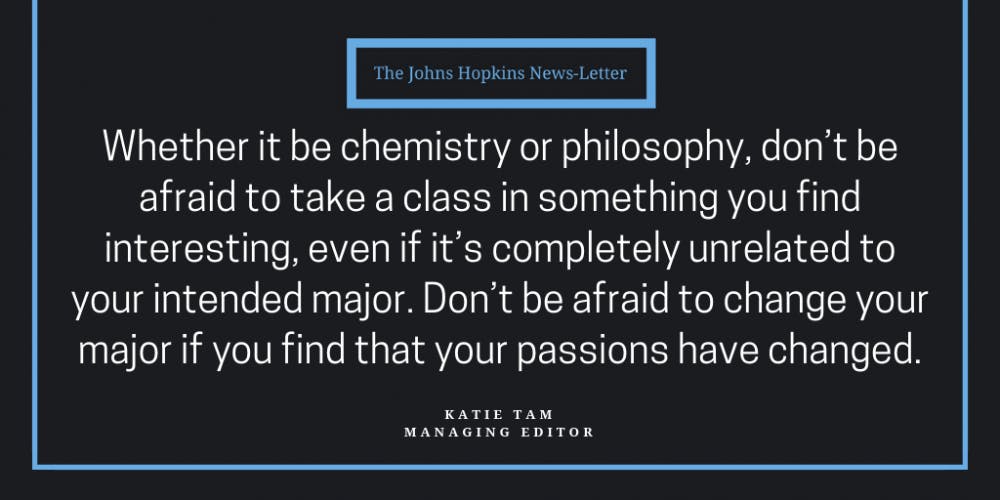“Are you planning on going to medical school?”
This question has plagued me since my decision to attend Hopkins. The University is known primarily as a science, technology, engineering and mathematics — or STEM — school. We have an outstanding, world-renowned medical school, fantastic research opportunities at various labs around campus and no shortage of a multitude of science and engineering advances made by Hopkins researchers.
So when I told people that I’d be going to Hopkins, they would always assume I would be studying something science related. It was almost an expectation that I do so. Despite this, I entered Hopkins as an economics major.
Economics was an interest of mine that I was excited about pursuing. Yet in the months leading up to my departure to Baltimore, I would get remarks from people asking why I wasn’t majoring in something science related. It seemed strange to others that I was attending a school that excelled in STEM, but choosing not to pick a major in the field. My mom still, to this day, asks me why I chose not to pursue something in STEM. I began to question myself as well.
And so my answer to “What are you planning on majoring in?” morphed from “economics” to “economics and public health.” Public health was something I had considered in the past, and it paired well with economics. The strength of the University’s public health department made me less anxious about the thought that I was choosing the “wrong major.” Unfortunately, these plans fell through when I failed to enroll in any classes related to public health my freshman fall. But while public health was erased from my plans, my desire to fulfill the expectation that I would major in something STEM-related was not.
My freshman spring, I took Introduction to Java, which piqued my interest in computer science. My mom had always pushed for me to pursue a degree in computer science, so she was ecstatic when I told her I decided to declare it at the end of my freshman year along with economics. She wasn’t so excited when I told her I was dropping it less than halfway into my sophomore fall semester, though. While I had an interest in the subject, I just wasn’t good at it. I couldn’t wrap my mind around data structures and the homework assignments stressed me out so much I probably lost a few years off my life.
During this time, I had also been taking several writing classes on the side. I’ve always liked writing; I liked reading about, analyzing and writing about books. I was also good at it, which was a major plus after my failed foray into computer science.
I began to realize that just because I go to Hopkins doesn’t mean I have to major in something the school is known for, especially if it’s not something I am interested in. Hopkins has great programs in whatever major you decide to pursue. I finally declared English as my secondary major at the end of my sophomore fall semester and haven’t looked back since.
Thinking back, I realize that I only added public health and computer science because I felt as if I needed to justify my choice in major to friends, family, teachers and even myself to an extent. It wasn’t because I was truly interested in the subject, but rather because of the expectations of attending a STEM-oriented institution like Hopkins. I liked the idea of being a public health or computer science major more than actually being one.
Through lots of trial and error I discovered that economics and English were the majors I truly wanted to pursue. It took time for me to find my path, and there’s no shame in that. You shouldn’t feel bad if you don’t have a plan yet either. Take time to explore your options. Your time here does go by fast, but that doesn’t mean you have to rush into choosing a major you’re not sure you actually want to pursue.
Most of this article has been reflecting on why I chose not to major in a STEM field. All of this isn’t to say that you shouldn’t major in STEM — what I am saying is that you shouldn’t be afraid to explore and even embrace subjects you may have never considered before.
Whether it be chemistry or philosophy, don’t be afraid to take a class in something you find interesting, even if it’s completely unrelated to your intended major. Don’t be afraid to change your major if you find that your passions have changed. And most importantly, don’t be afraid to reach out and ask for help. Advisors, professors and other Hopkins students are great resources when looking into majors. You’re only a freshman; you don’t have to know exactly how the next four years are going to go. That’s part of the fun of college.

















